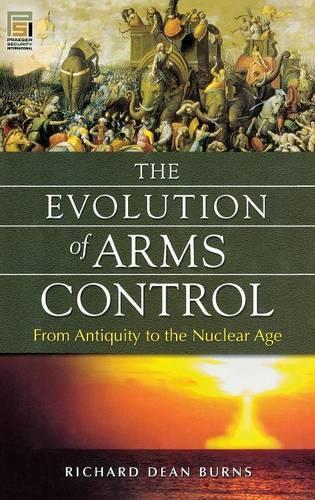
The Evolution of Arms Control: From Antiquity to the Nuclear Age
(Hardback)
Publishing Details
The Evolution of Arms Control: From Antiquity to the Nuclear Age
By (Author) Richard Dean Burns
Bloomsbury Publishing PLC
Praeger Publishers Inc
22nd June 2009
United States
Classifications
Tertiary Education
Non Fiction
327.174
Physical Properties
Hardback
251
Description
The Evolution of Arms Control: From Antiquity to the Nuclear Age is the first world history of arms control through time. Drawing on his knowledge of the comparative history of warfare and arms control across preliterate, ancient, medieval, and modern polities, Richard Dean Burns focuses longitudinally on such perennial arms control issues as negotiation, verification, and compliance. Although he does not, for example, allege that war elephants and nuclear weapons are of equal destructive potential, he does discern instructive similarities between Carthage in 202 BCE and Iraq in 1991 AD. Arms control and disarmament measures have been pursued and adopted throughout the history and prehistory of human warfare: sometimes as protocols recognizing evolving humanitarian taboos; sometimes as terms imposed by the victors on the vanquished; and sometimes as accords negotiated between rivals fearful of mutual destruction. Arms control measures ramped up in significance and urgency at the dawn of the 20th century by the introduction of rapid-fire weapons, aircraft, chemical agents, and submarines, and again at mid-century with the advent of weapons of mass destructionnuclear, chemical, and bacteriologicalwith sophisticated delivery systems. As Burns makes clear, the enormous increase in destructive potential brought about by thermonuclear weaponry essentially changed the nature of war and, therefore, of arms control.
Reviews
Written for anyone interested in arms control and disarmament issues as well as military history, this book reviews the historic means and techniques for arms control such as demilitarization, regulation of arms manufacturing, stabilizing international environments and the outlawing of war. A section also reviews nuclear weaponry before and after the Cold War and the emergence of biological and bacterial delivery systems. * Reference & Research Book News *
History has shown that war is terrible, but it would be even be more horrifying if nations had not attempted to place limits on armed conflict. Few readers could have imagined the painstaking negotiations involved in reaching agreements placing restrictions on weaponry, torture, and other unsavory components of modern war until Burns, a recognized expert in foreign and national security affairs, published this new book. The author (emer., history, California State Univ., Los Angeles) highlights the historical antecedents that are at the heart of modern weapons control accords. But he goes further than that and outlines how victors sought to disarm their former adversaries, as Rome did with Carthage following the Punic Wars or the Allies did in Germany after WW II. Today, however, the issues are more complex and require considerable engagement on the world stage. Burns chronicles the progression of arms negotiations, allowing readers to visualize the intricacy of arms control and grasp the difficulties of finding common ground in preventing the spread of nuclear weapons. Whether the world's diplomatic efforts will be successful remains to be seen. Still, a major contribution. Summing Up: Highly recommended. All levels/libraries. * Choice *
Author Bio
Richard Dean Burns is professor emeritus of history at California State University, Los Angeles, CA. He is the coauthor/co-editor of 12 books, including Praeger's Reagan, Bush, Gorbachev: Revisiting the End of the Cold War and ABC-CLIO's Arms Control and Disarmament: A Bibliography.
